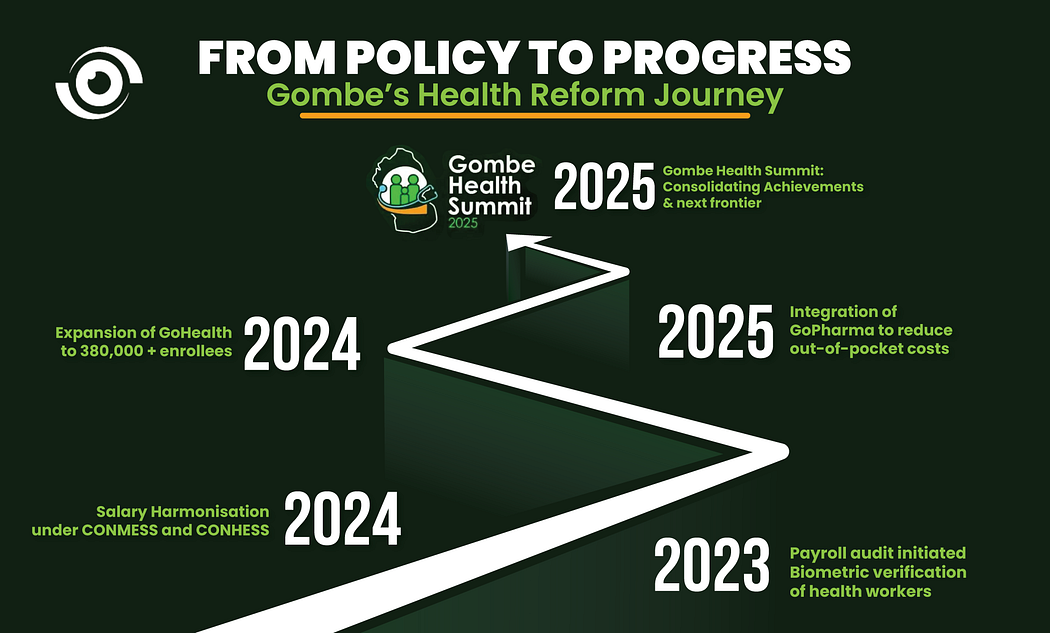Sheriff Gbadamosi and Uche Kennedy (Lead Writers)
When Gombe State’s Governor, Muhammadu Inuwa Yahaya, announced the full implementation of the Consolidated Medical Salary Structure (CONMESS) and Consolidated Health Salary Structure (CONHESS) for health workers during the just-concluded Gombe Health Summit, the hall erupted in applause. For many participants, it was more than a pay raise, it was a statement of intent. The commitment, valued at ₦250 million monthly, signals a shift towards sustainable health financing and accountability as the true foundation of system transformation.
The two-day summit, themed “Transforming the Health System in Gombe State: Accomplishments, Challenges and the Next Frontier,” brought together federal and state leaders, health professionals, civil society organisations, and development partners to reflect on the state’s health trajectory and chart a future anchored in equity, transparency, and resilience.
A New Conversation on Financing and Accountability
Nigeria’s First Lady, Senator Oluremi Tinubu, in her opening remarks, declared that “a healthy state is indeed a healthy nation.” Her words underscored a growing recognition that meaningful transformation depends not just on new buildings or policies, but on how resources are mobilised, managed, and monitored.
In the years preceding the summit, Gombe embarked on a series of fiscal reforms that prepared the ground for this moment. Through biometric verification, the state uncovered over 440 ghost health workers, saving approximately ₦4.5 billion in unrealised payroll costs. These savings, according to the Governor Yahaya, are now being redirected into critical health infrastructure, from the new Federal Medical Centre in Kumo, to a women and child hospital, and the state’s School of Nursing.

These actions demonstrate that the state is taking a pragmatic, data-driven approach to strengthening its health system, and the link between fiscal integrity and service delivery which has been long discussed but rarely demonstrated, is finally being tested.
Beyond Salaries: Investing in Systems That Work
The summit placed health financing and workforce motivation at the centre of Gombe’s health reform agenda. By adopting the full CONMESS and CONHESS salary scales, the government hopes to address chronic shortages of doctors, nurses, and allied health professionals, particularly in rural areas where facilities often operate with few staff.
Yet, salary reform alone will not fix the system. The challenge, as discussed by participants, is ensuring that financial investments translate to visible improvements in service delivery. Accountability must also stretch beyond payroll to include drug supply chains, infrastructure maintenance, and data transparency.
The Governor highlighted the integration of the Gombe State Health Insurance Scheme (GoHealth), now with over 380,000 enrollees as a critical pillar of financial protection. The scheme is complemented by GoPharma, the state’s pharmaceutical enterprise, which aims to reduce out-of-pocket expenditure on medicines and also the revitalisation of 228 primary healthcare centres, upgrades of general hospitals across the three senatorial zones. Together, these initiatives represent Gombe’s growing confidence in home-grown models of universal health coverage.

The Real Test: Sustaining the Momentum
While the summit celebrated milestones, it also served as a reminder that gains can easily erode without long-term fiscal discipline. Health experts at the event warned that many Nigerian states launch promising reforms but fail to institutionalise them once leadership changes or fiscal pressures rise.
For Gombe, sustaining momentum means embedding reforms within legislative and budgetary frameworks. The commitment to pay health workers with federal salary structures for instance, must be protected from political cycles. Similarly, the biometric payroll system, which rooted out ghost workers should evolve into an open, citizen-accessible dashboard that tracks how recovered funds are reinvested into primary health care (PHC).
Beyond these reforms, the success of GoHealth and GoPharma will depend on how effectively the state reaches its most vulnerable populations, women, children, and rural communities who often face the steepest financial and geographical barriers to care. This challenge is reflected in Gombe ranking as the third poorest state in Nigeria, according to the 2022 Multidimensional Poverty Index (MPI).
From Accountability to Trust
Perhaps the most compelling outcome of the Gombe Health Summit is implicit recognition that financial accountability is a trust-building exercise. When citizens see transparency in resource use, they are more likely to return to public facilities and participate in health programs. This linkage between financing and trust was reflected in discussions around the revitalisation of primary health centres. Participants noted that while new facilities are being built, the public’s confidence in PHCs will hinge on their experience of consistent staffing, quality of care, availability of essential medicines and coverage of underserved communities in the State Health Insurance.

As one panelist, Dr Ibironke Dada, Director of SafeCare, Pharm Access aptly put it, “When a community sees its health workers paid, medicines available, and data shared, they start believing again that government can work for them.”
Policy Recommendations for Gombe and Beyond

Drawing from the communique presented by Gombe State’s Commissioner of Health, Dr Habu Dahiru, several strategic actions could help sustain progress in Gombe State and inspire replication across other Nigerian states:
- Legislate Health Financing Commitments: Institutionalise salary reforms and facility funding within annual budgets and legal frameworks to ensure continuity beyond political cycles.
- Expand Health Insurance Coverage for the Poor and Vulnerable: Engage local government area authorities to contribute to equity funds to expand GoHealth insurance coverage and enroll the poor and vulnerable in hard-to-reach households.
- Capacity Building for LGA Actors: Targeted capacity building is essential to equip LGA officials with the skills to plan, manage, and transparently report the use of federal health allocations at the local level.
- Publish Health Spending Dashboards: Regularly share payroll, GoHealth, and GoPharma expenditure data with the public to deepen transparency and civic trust.
- Reinvest Recovered Savings into PHCs: Direct the savings from ghost worker eliminations toward PHC revitalisation, staff recruitment, and operational funding in underserved LGAs.
- Link Pay to Performance and Supervision: Embed clear performance indicators for health workers attendance, service quality, and patient satisfaction to sustain motivation and accountability.
- Health Training Fund: Replicate Tertiary Education Trust Fund (TETFUND) model to establish a tertiary health training fund in the health sector and get more private sector and philanthropic support.
A State Setting a National Example
The Gombe Health Summit 2025 may be remembered for what it symbolises, a state taking ownership of its health future through fiscal honesty, local accountability, and a vision rooted in sustainability.
In a period when many health systems across Nigeria are struggling under the weight of poor funding and weak governance, Gombe’s model is a reminder that reform begins when every naira is traced, every worker is seen, and every citizen counts.
If sustained, this could mark the true frontier of health system transformation, not in new buildings or high-level plans, but in the everyday discipline of financing what matters most: people’s health, and demonstrating political will, aligning and operationalising national initiatives like the Sector-Wide Approach and the Nigeria Health Sector Renewal Investment Initiative with the promise of equitable, quality healthcare for all through its second pillar.


